- Home
- Alton Gansky
Wounds
Wounds Read online
Wounds, Digital Edition
Based on Print Edition
Copyright © 2013 by Alton Gansky
All rights reserved.
Printed in the United States of America
978-1-4336-7718-2
Published by B&H Publishing Group
Nashville, Tennessee
Dewey Decimal Classification: F
Subject Heading: MYSTERY FICTION HOMICIDE—FICTION SERIAL KILLERS—FICTION
Publishers Note: The characters and events in this book are fictional, and any resemblance to actual persons or events is coincidental.
Scripture quotations are taken from the Holman Christian Standard Bible (HCSB), Copyright © 1999, 2000, 2002, 2003, 2009, by Holman Bible Publishers. Used by permission. Holman Christian Standard Bible, Holman CSB and HCSB are federally registered trademarks of Holman Bible Publishers.
To Reverend Don Venosdel,
Now in glory and much missed here.
Thanks for the decades of wisdom.
Prologue
A bead of sweat trickled down the preacher’s spine, trekking south toward a perspiration-soaked waistband. It wasn’t the first bead he had felt since stepping on the platform, and twenty years of experience told him it wouldn’t be the last. For two decades he had trod well-worn hardwood floors that clad a thousand stages around the world.
The growing rivulet widened and flowed faster with each minute. A similar outpouring ran from beneath his arms and down his sides, gluing his dress shirt to damp skin. Along the hairline, moisture oozed through pores and wetted his dark hair—hair two shades lighter than coal. The skin of his tanned face felt like an over-saturated sponge on the verge of disgorging its cargo of sweat. A round belly proved that his ever-youthful appearance belied his fifty-five years.
On the stage, dressed in a collarless shirt the color of obsidian—an attempt to look thinner than his 220 pounds—a gray suit coat, and black pants, he moved with the energy of a man two decades younger. On stage he still looked more youthful than he was. Television proved a different matter. The camera had no allegiances to men of the cloth. High-definition digital video remained steeped in truth, conveying every wrinkle, age spot, and other epidermal faults. After reviewing his last television interview, the preacher wished for the days when digital detail mattered less than content.
He moved to the lectern again, a handcrafted pulpit made by a faithful woodworker in Tennessee as a gift to the ministry. More than the composite of hard maple with ebony trim, the pulpit held electronics that preachers of a generation before would never have dreamed. A clock gave the local time; a lapse timer showed that he had been preaching for twenty-one-and-a-half minutes. A small plasma screen connected to the television feed served as a video monitor giving real-time feedback about which of three cameras gazed on him at the moment and what the world would see once the editing and distribution had been done.
Somewhere beyond the glare of the spotlights sat an audience hanging on his every word. Hubris did not plant the thought in his mind. Rather, hundreds of sermons in scores of countries and every state in the union had done so.
He had traveled so much that there were times he couldn’t remember which city hosted his crusades. Today, however, he knew citizens of Philadelphia filled the sports arena. He had visited the Liberty Bell earlier that day, a special tour granted by the city and the historical society that managed such things.
He paused his machine-gun delivery. Not because he had lost his place but to heighten his point. All good speakers know the trick, and the world had judged him to be one of the most gifted orators of his or any generation. The platform was his throne and he made use of it.
In exactly three minutes, he would bring his sermon to a climactic close. People would stand and sing. Hundreds would come forward, and shortly after he would exit stage right.
Gone were the days when he could spend time with the people who had come to hear words of hope and promise. Gone, too, were the times of shaking hands and personal prayers, of intimate fellowship. All replaced by drum-tight security. Bodyguards were a requirement these days. The ministry spent thousands of donated dollars just to keep him safe.
What had the world come to when a simple preacher-man couldn’t step on a stage without first wondering if it would be his last public appearance?
The death threats hadn’t helped. Threats that came every week like clockwork. No matter where he was in the world, word would reach him and always with the same message: “THY MAKER AWAITS.”
The Reverend Dr. Daniel Templeton’s gaze drifted to the audience and he wondered . . .
Did his tormentor look back?
He leaned over the sink of the tiny, dirty bathroom, eyes fixed on the steady flow of water that poured from the chipped, rusted faucet. The water drew him, serenaded him with a song only he could hear.
He leaned closer and watched the colorless cascade. The sound of it filled his ears with a rhythm that matched a heart beating at full throttle. The event had occurred over an hour ago, but the thrill of it fueled the pulsing behind his sternum.
A smile tickled the corners of his mouth.
He bent more and moved closer, closer, until the tip of his nose hovered an inch from the stream. Too close now to focus, he closed his eyes, allowing the sound of the water to become his lullaby. Tiny drops splashed from the bottom of the sink, dotting his face.
It had been so easy. It had felt so right. Every step fell in place. Every motion planned. Every detail observed. The act had been completed just as he saw it a hundred times in his mind.
The smile widened.
He straightened and looked at his reflection. The naked man staring back didn’t fit the image chiseled in his mind. That man remained eighteen, full of energy and muscled by unrelenting exercise. The man in the mirror still displayed muscles twice the size of any other man in his late forties, but he also showed skin that looked thinner than it should and was dotted with skin tags and undefined dark spots—the latter the result of too many years of careless sun exposure. He hadn’t cared about such things when he wore a younger man’s clothes, and he didn’t much care now.
He closed his eyes again and saw the body, saw the markings, and relived the unexpected turn.
That didn’t matter now. The result remained the same even if the catalyst had been unanticipated. That was the thing with murder. No matter how well planned an execution might be, things could change.
He turned off the faucet.
He couldn’t turn off the visions or the voices.
1
Thursday, March 28, 2013
Flies.
The buzzing bothered her the most. No matter how many times she heard it, no matter the number of times she had seen what drew the insects, the sound still ate at the lining of her stomach.
“Cover him.” Carmen Rainmondi frowned and turned away, giving no outward indication of the discomfort within. Was she losing her edge?
A uniformed officer stood to her right. Tall and lanky, he looked too young to shave. He also looked a little green around the gills. “You don’t want to wait for the rest of the team?” He followed the words with a hard swallow.
Carmen gave the officer a glance, then shook her head. “It’s a public place. It won’t be long before parents will be walking by with their children. I don’t want letters telling the chief how we scarred their kids for life. Now are you going to cover him or do you want to jaw about it some more?”
“Got it. No problem.” He trotted toward one of the black-and-whites, its emergency lights tossing splashes of red and blue in the air. Carmen noticed tha
t he moved with care, following the same path out that they had taken in.
At least the newbie got that right.
She forced herself to face the body again. Face down, arms and legs askew, the victim looked as if he had fallen from a low-flying airplane. She could see he was young. He wore only a pair of brown shorts—no shoes, no shirt, no cap. The same dew that covered the grass dampened the body and clung to his hair. There were no signs of gunshot or knife wounds, but she could see a series of dried blood drops covering his back and the one side of his face she could examine.
Studying the shorts, Carmen saw what she hoped to see: a bulge in the right rear pocket. With a latex-gloved hand she removed the wallet, which felt thin and light. Right pocket; right-handed. Nothing earthshaking in that realization, but details mattered. Sometimes the little things turned the whole case.
Like the officer before her, Carmen carefully retraced her steps and ducked beneath the yellow crime-scene tape that cordoned off a quarter-acre of ground. The smell of eucalyptus trees mixed with the perfume of a dozen different flowering plants followed her. The sun crawled up the blue San Diego sky on the same journey it had made millions of times before.
Many considered Balboa Park one of the most beautiful places in the city and Carmen agreed. She spent a summer of her college years working at the historic park. As part of her training, her employers pounded some of the park’s history into her brain. She knew more about the fourteen-hundred-acre area—complete with quaint cottages, spectacular Spanish Colonial buildings, museums, and stage theaters—than those living nearby.
The park was the jewel in the Chamber of Commerce’s crown. Having a badly beaten body lying on emerald grass dulled the gem.
“I used to love this place.”
The words snatched Carmen from her thoughts. “Huh?”
“Wool gathering, Detective?” Bud Tock had come up behind her. Tock worked homicide too, and they were often teamed together. He would be the number-two detective on the case.
“Yeah, I guess I was. I used to work here.”
“In the park or at the Botanical Building?” He motioned to the long, wide, wood-lathe structure with a rounded trellis for a roof.
“I worked at the Reuben H. Fleet Science Center. They have a gift shop. Those were some slow hours.”
“I’ll bet.” He paused as he looked beyond the cordoning tape. “Did you take a peek?”
Tock stood tall, lean, and somehow managed to look younger than his fifty-one years. Unlike many men his age, his dark hair had not deserted him, but it yielded to spreading gray. Carmen at forty-six, however, fought a relentless battle against a broadening waist and the appearance of new wrinkles. She did her best to look sharp, professional, and just attractive enough, but she wondered whether a day would come when she just quit caring about such things. Her brown hair showed a tint of red in the sunlight. It always had.
She let her eyes linger on Tock for a moment, like a dieter eyeing a piece of cheesecake, but those thoughts cinched closed. They had history, she and Tock. They had been an item. It began five years ago and ended with brutal honesty thirty days later. Every time she thought of that month she felt the bitterest pleasure and the sweetest regret. Three months later he married another woman. It was his third marriage. She had yet to have one.
“I asked if you took a peek. You okay?”
“I’m fine. Didn’t sleep well last night. Too much caffeine or something.” The lie came easily. “I’m having the body covered. Too many civilian eyes around here. Or there will be soon.”
“We probably have an hour before the crowds arrive. At least it’s Thursday, not a weekend. What have we got?”
“Male, white, young, maybe early twenties. My best guess is he’s been dead for six hours or so. I’ll let the ME give us a better estimate on time.”
Tock pursed his lips. “So someone did him in the wee hours? Three or four a.m.?”
“Probably.”
“I think we should close the grounds to the public. The Botanical Building is a pretty big draw. I also suggest we have a couple of officers tape off the walkways.” He paused. “That is, if it’s okay with you. You’re lead dog on this sled.”
“Lead dog? I see you still know how to sweet-talk a woman.”
“My wife won’t let me sweet-talk other ladies. She says it just breaks their hearts.” He pointed at the object in her hand. “Is that his wallet?”
“I just retrieved it.” Carmen opened the billfold. “It looks like he’s had it for some time. The leather is worn at the fold.”
The first thing she looked for she found behind a clear plastic window. “California driver’s license . . . Doug Lindsey . . .” She studied the date on the license and did the math. “Twenty-three. He would have been twenty-four next month.” She continued her search through the wallet. “Usual stuff: a credit card, debit card, a picture of his family. Looks like his mom and pop. Twenty-three dollars and . . .”
“And what?”
Carmen removed a thin, plastic-coated card from one of the wallet’s compartments. “Student ID. It appears young Mr. Lindsey attended San Diego Theological Seminary.”
“Never heard of it.”
She grinned. “I’m not surprised.”
“Oh, is that how it is? I don’t recall seeing you hanging around any churches.”
“They see me coming and bar the doors—afraid the roof will cave in.” She studied the card. “The address says the seminary is in Escondido.”
“What about wounds?” Tock moved toward the yellow tape. “See anything to make our job simple?”
“No holes from a knife or bullet that I could see. I haven’t moved the body yet. Still waiting on the team.”
Homicide procedures demanded no work begin until the full team arrived on scene. The team members varied but always included a forensic technician, a sergeant, a scene detective, and another homicide cop. Sometimes individuals had to travel some distance to arrive. San Diego County covered more than forty-two hundred square miles, and San Diego City covered three hundred and forty-two of those. The county’s population approached nearly three million, and a third of those lived in the city proper. Police staff could live in any of eighteen incorporated cities or seventeen unincorporated communities. It might take one team member ten minutes to arrive and an hour for another. In the meantime, detectives like Carmen had to wait and twiddle their thumbs. It made for lousy and misleading news coverage.
“There’s something you’re going to want to see,” Carmen said. “It’s a new one on me.”
“What?”
“Words aren’t going to do it justice. This is one of those have-to-see-to-believe deals.”
“I’m feeling impatient. Let’s take a look now.” Tock moved toward the crime scene and Carmen followed a step behind.
The uniformed officer struggled alone to unfold a thin plastic tarp. Two older officers watched and snickered. As Carmen and Tock reached the tape barricade, one of the officers fast-stepped to help the rookie. Carmen said nothing to the man—the razzing new officers received at the hands of veterans was part of the cop bonding process that turned strangers into partners. It was the price paid to enter the tribe.
“Hold up on that,” Carmen said to the young officer.
“But you said—”
“I know what I said. Just hang on a minute. Detective Tock wants to see the body.”
Tock approached, careful of his steps.
Less than two minutes later, Tock shook his head. “What’d the guy do? Sleep on a bed of nails? He looks like a pin cushion.”
“I assume you noticed his face. Same small puncture marks.”
“They don’t look deep, at least not at first glance. Can a man die from a hundred shallow punctures?”
Carmen shrugged. “I suppose i
t depends what he was punctured with.”
“A hundred poison darts? Not likely.”
“Agreed. He was alive when it happened.” Carmen gazed at the corpse. The two officers gently laid the plastic tarp over the body.
“Yeah, I saw the blood streaks. Looks like he was allowed to bleed for a while, but I don’t see a pool of blood. Maybe the wounds are deeper than they look and he bled out internally.”
“Torture?”
“Maybe, but who would want to torture a seminary student? And where is the rest of his clothing? It’s still a little cool at night to be running in nothing but shorts.”
Tock stared over Carmen’s shoulder. “Here comes the cavalry.”
Carmen followed the gaze and saw several of the homicide team arriving. “Good. I’m itching to get started.”
“My gut tells me you’re going to have your hands full with this one.”
Carmen’s gut told her the same thing.
2
Contentment. That which Ellis Poe loved surrounded him: books, journals, student papers, and silence. Outside his office window on the campus of San Diego Theological Seminary shone a bright morning sun, which sparrows serenaded with chirps and twitters. He let the morning image paint his mind. The seminary sat on top of one of the many hills in Escondido. Ellis could see the sprawl of the city. At night the sight proved more pleasing than a painting. The daytime view was just as easy on the eyes, especially now that spring had sprung. Here, spring always came early.
Turning his back on the panorama, Ellis settled behind an oak desk that was older than his forty-five years. On its surface rested a Bible, a Greek New Testament, a copy of James S. Jeffers’s The Greco-Roman World of the New Testament Era, and three stacks of student papers—one for each of the classes he taught this quarter.
There were no students today. Classes were dismissed for the remainder of the week and all of next week. After all, tomorrow was Good Friday and Sunday would bring Easter—Resurrection Day, as he preferred to think of it.

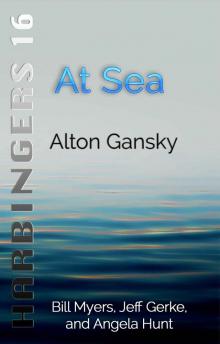 At Sea (Harbingers Book 16)
At Sea (Harbingers Book 16)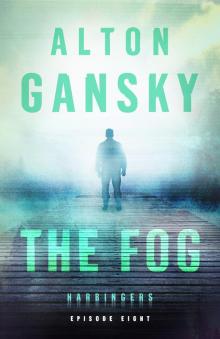 The Fog
The Fog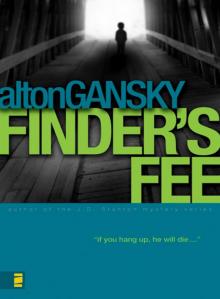 Finder's Fee
Finder's Fee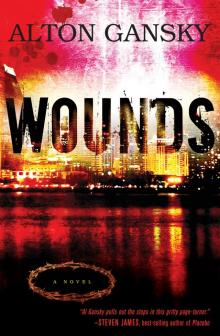 Wounds
Wounds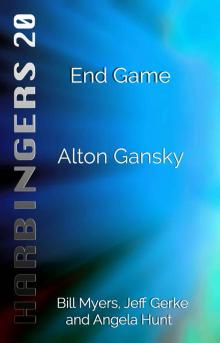 End Game (Harbingers Book 20)
End Game (Harbingers Book 20)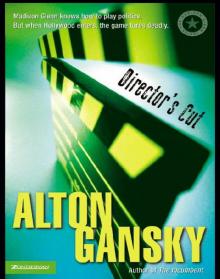 Director's Cut
Director's Cut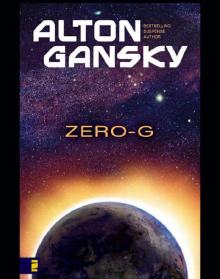 Zero-G
Zero-G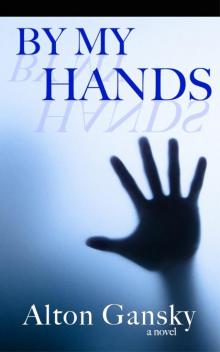 By My Hands
By My Hands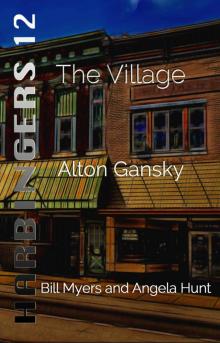 The Village (Harbingers Book 12)
The Village (Harbingers Book 12) Beneath the Ice
Beneath the Ice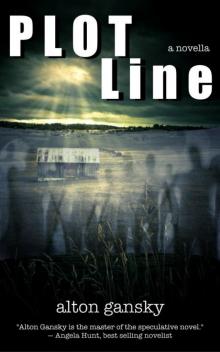 Plot Line
Plot Line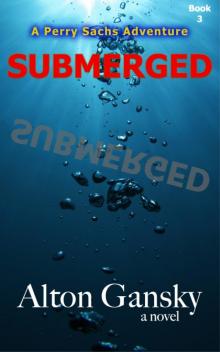 Submerged
Submerged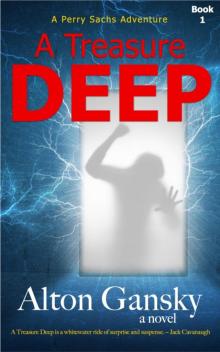 A Treasure Deep
A Treasure Deep